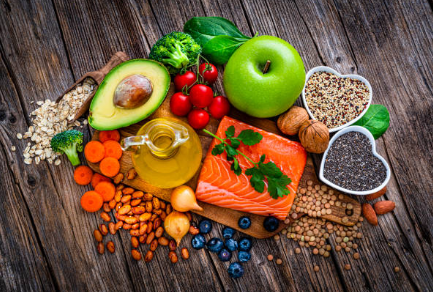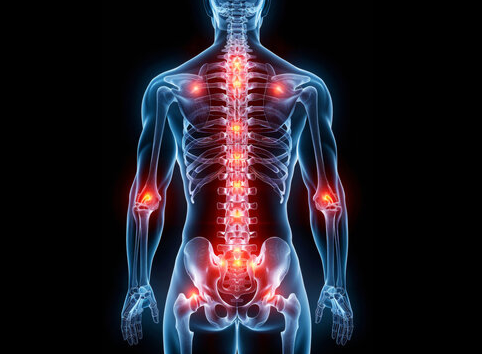We Are What We Eat
Why I choose an Anti-Inflammatory Diet

-
What is Inflammation?
Inflammation is a normal part of your body’s response to injuries and germs. When you twist your ankle, it swells (inflammation). Within inflamed tissue, cells are working hard to repair damage. If inflammation happens when there is no injury or germ, it can harm healthy parts of your body and cause a range of chronic diseases. Unfortunately, there are many things that can trigger and cause chronic inflammation if exposure is continuous.

- smoking
- alcohol
- sugary foods/beverages
- poor sleep
- toxin exposure/pollution
- improper liver detoxification
- obesity
- lack of exercise
- microbiome imbalances
- medications (such as NSAIDS)
- parasites
- low hormones
Diseases linked to chronic inflammation
- Cancer
- Heart Disease
- Autoimmune Diseases
- Gastrointestinal Diseases
- Type 2 Diabetes
- Asthma and COPD
- Alzheimer’s / Dementia
- Psoriasis / eczema
- Depression / Anxiety
So, you can see that most illnesses, outside of genetic mutations, can be traced back to over exposure to things that incite an inflammatory response. Unfortunately, you won’t notice the damage right away. However, it all adds up over time and then HAVING one of the diseases listed above ADDS to the body’s inflammation in a vicious cycle – leading to MORE diseases. Do you know anyone who has two or more of the listed diseases? Maybe even YOU do. The root is INFLAMMATION. Finding and eliminating the causes of inflammation in each person’s lifestyle is where healing begins.
What is an anti-inflammatory diet?
An anti-inflammatory diet consists of nutrient dense foods that support the body’s needs without ringing alarm bells for the immune system. The foods are high in antioxidants, which fight free radical damage, as well as good fats to support nerve and brain health. There is a great deal of variety to satisfy your taste buds, which makes it easy to follow and keep as a permanent part of your lifestyle.
Foods to include:
Vegetables: broccoli, cauliflower, kale, swiss chard, brussels sprouts, arugula, cabbage, bell peppers, onions, fennel, zucchini, cucumbers, squash, mushrooms, artichokes, asparagus,lettuces, snap peas
Fruits: tomatoes, strawberries, blackberries, raspberries, goji berries, blueberries, golden berries, cherries, pomegranate,
Fruits *in moderation due to high sugar: grapes, peaches, pears, oranges, apples, mangos, bananas, papayas
High Fat Fruits: Avocados, olives, coconuts
Nuts (soaked prior to consumption): walnuts, almonds, cashews (NO peanuts because high risk of micotoxin from mold), * pistachio don’t need to be soaked
Beans * MUST be soaked to remove lectins, or they are inflammatory.
Spices: Turmeric, ginger, cinnamon, fenugreek, cardamom, black pepper, sage, cayenne, chamomile, cilantro, cloves, garlic, rosemary, parsley
Wild Caught Fatty Fish: Alaskan salmon, sardines, herring, mackerel, anchovies, tuna (farm raised have antibiotics and other toxins that increase inflammation)
Shell Fish *in moderation due to high cholesterol and potential contaminants: Shrimp, prawns
Oils: Avocado, Olive (if cooking- use coconut oil due to free radical formation from the others). NO seed oils of any other kind!
Chocolate: Raw caco powder, *dark chocolate – choose brands with LOW heavy metals.
Tea: Green Tea, Matcha
As you can see, there are a LOT of choices! How you prepare them will also determine their anti-inflammatory properties. All of the listed items are best if they are organic and non-gmo. Any fruit or vegetable without a peel should always be organic. Washing will remove many, but not all contaminants.
Preparation: Use these foods in salads, soups, and stir frys. You can eat raw, steamed, or baked. You can pickle and ferment. Do NOT deepfry or cook them in any oil other than what is listed.
Foods to Avoid:
Meat: Red meat, such as steak and hamburgers; processed meat, such as bacon, sausage, and processed lunchmeat
Bread, Pasta, Pastries: Anything with gluten, sugar, or prepackaged/processed snack; cakes, cookies, candies. *ALL refined sugar is inflammatory.
Deep Fried anything
Alcohol
Soda with High Fructose Corn syrup or sugars
Chips/crackers made with potatoes or wheat flour/gluten.
I hope that you now have a better understanding of just how diverse a healthy diet can be! You may have noticed that I left off all dairy products, grains, and starches. Some grains, like wild rice, quinoa, and oats “can” be inflammatory if insulin regulation is an issue for someone. This is also true for starchy vegetables. Dairy is often hard on most people’s digestive systems in general. The lists above show foods that definitely can be included and those that should be eliminated. I would make the listed foods the majority of your diet if you are looking to reduce inflammation and steer clear of all the foods to avoid.
Here are links to some resources for recipes you can start incorporating today!